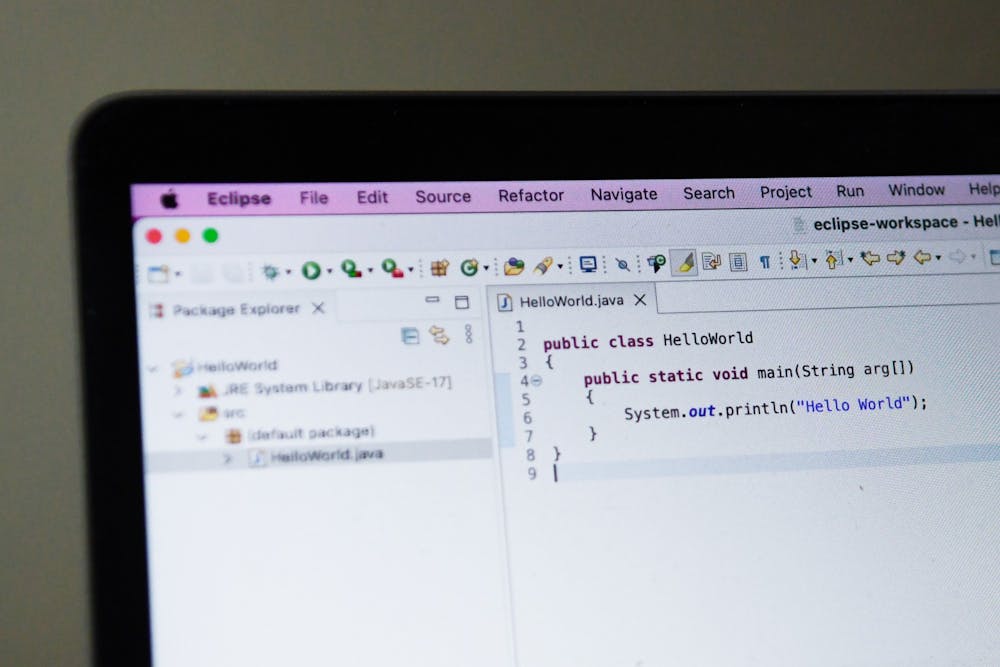
My path to complete my computer and information science minor at Penn has been long and winding, rife with self-doubt and numerous failures, but also with many victories and moments of personal growth.
I have taken coding classes that I wanted to drop two weeks later because I did not trust my own skills. This happened with my first, second, third, and fourth coding classes in high school. In college, I wanted to drop CIS 160, and when I didn’t, I wanted to withdraw. I have felt dejected and defeated for receiving poor grades on tests that I worked hard on. However, I never did drop, and, in fact, ended each course with a strong grade. I continued to persevere and push myself because deep down, I sought and still seek discomfort.
As course registration opens soon, my experience with computer science offers two important lessons.
The first is to push yourself outside of your academic comfort zone. Taking cross-disciplinary courses provides opportunities to view yourself, your surroundings, and the larger world differently.
Difficult and novel courses will make you think harder, forcing you to challenge the way you view yourself and your world. No longer will everything around you be viewed solely through a “humanities” or “engineering” lens, but instead through a confluence of the two. In the increasingly integrative and complex world that we live in today, having the skills and abilities to pivot across disciplines is key.
Any professional basketball player can shoot a free throw, any chemist can balance a chemical equation, and any constitutional lawyer can explain the intricacies of the First Amendment. Yet, it takes a truly brave, courageous, and confident individual to merely dip their toes into uncharted multidisciplinary waters. Few constitutional lawyers can shoot a free throw or balance a chemical equation. Those who can, though, are likely thankful for the multidimensional worldview they have as a result.
More importantly, while you may not always succeed in these new spaces or receive the best grades, the inherent process of struggle, perseverance, and personal success will lead to unmatched levels of self-growth. If you intentionally and strategically expose yourself to difficulty, you will experience positive physical, mental, and emotional change.
In this case, taking a course outside of your comfort zone will simply make you comfortable with the uncomfortable. You don’t need to be good at what you do; you just need to try. The Penn curriculum is purposely designed to allow students room to take these very courses while still having more than enough time to complete majors.
My experience with computer science exemplifies this. I’m a political science major. I’m bad at math. Proofs bore, frustrate, and sadden me. Yet, I could not be happier that I took these classes. Because of them, I trust myself more and am now more willing and confident to try something new, academic or not.
The second smaller and separate lesson from my time in computer science classes is that they help students ease into the increasingly tech-based corporate landscape. At their core, all companies are tech companies. Some, like Google and Apple, are what I refer to as “pure” tech companies, or those in which technology is the foundation of the product. Yet, all other corporations still rely on the use of code and technology to operate on a daily basis through websites, data analysis, mobile apps, and more.
Even outside of jobs, the world has become tech-dominated. We take classes on our laptops, order food on our phones, and receive much of our entertainment on our TVs. This article itself will likely be read many more times online than it will in print. Having a foundation of knowledge in computer science will thus be incredibly useful, regardless of where you work or what you do.
Not convinced? There are 500,000 current job openings in computer science-related professions, and the amount of available computer science jobs is projected to grow by 22% by 2030, 175% higher than the average occupation. Taking even one computer science class can put you at an advantage over many others who have no knowledge of how to code — there are similar benefits to taking any course in a major one isn’t initially familiar with.
While I pushed myself through computer science, that doesn’t need to be the case for everyone. Regardless, through my experience, I have learned that seeking discomfort leads to exposure, this exposure leads to comfort, and this comfort leads to confidence and courage. With these two traits, you feel empowered to try novel things, inside and outside of academics. More importantly, with these two traits, you can seek even more discomfort; with that, you can try anything.
DANIEL GUREVITCH is a College sophomore from Wynnewood, Pa. studying political science with a minor in computer science. His email is dgure@sas.upenn.edu.
The Daily Pennsylvanian is an independent, student-run newspaper. Please consider making a donation to support the coverage that shapes the University. Your generosity ensures a future of strong journalism at Penn.
Donate







